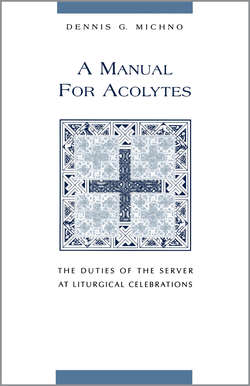Читать книгу A Manual for Acolytes - Dennis G. Michno - Страница 7
На сайте Литреса книга снята с продажи.
Preface
Оглавление“THAT IN ALL THINGS GOD MAY BE GLORIFIED”
The Book of Common Prayer states, At all celebrations of the Liturgy, it is fitting that the principal celebrant, whether bishop or priest, be assisted by other priests, and by deacons and lay persons. (BCP, 322 & 354)
When serving at the altar, one is doing just this: actively assisting the celebrant in the worship of God. This is an important ministry and should be approached with dignity, humility, and care. The server should be well acquainted with the responsibilities and perform the duties with diligence. Sloppiness is to be avoided; stiff or artificial movement is to be avoided; careless or unseemly behavior is to be avoided. In all things, the server must be aware that the purpose in assisting at the altar is “that God may be glorified.”
This manual is designed to describe those duties expected of you as a server. Server means one who assists—the terms acolyte, crucifer, and thurifer (as used in this manual) apply to specific responsibilities. No manual can be complete, inasmuch as the custom or use of each parish church varies. However, there are basic directions that apply, governed either by the rubrics of The Book of Common Prayer or by tradition. In all things, the specific manner in which one serves and the ceremonial used is determined by the parish priest or the person appointed for this purpose. Most of what will be expected of you can be found in this manual. Also, there may be ceremonies or duties described here that are not part of your parish liturgical life. These are listed as “optional variants” in the main chapter on serving (Chapter 9), and identified by “in some places …” in other parts of the manual. Again, your priest will instruct you.
There is absolutely no “right” or “wrong” way to serve. The best rule is that all should be done with dignity and care in the simplest way possible so as not to distract the congregation. Consistent action aids this and helps prevent sloppy carelessness on the one hand and fussiness on the other.
The patron of those who serve at the altar is Vincent, Deacon and Martyr. He lived in the late third century, was martyred in the year 304, and is commemorated in our calendar on January 22. Vincent is remembered for his love of God, his faithfulness to his bishop, and his unswerving loyalty to his responsibilities. These traits—love, faithfulness, and loyalty—are virtues that all who are privileged to serve at the altar should cultivate. Remember: our purpose is rooted in our love of God, our faithfulness is seen in our willingness to serve responsibly, and our loyalty is demonstrated in how carefully we carry out our duties. Love, faithfulness, and loyalty are the virtues we seek to perfect. The server’s aim is to be as steadfast as St. Vincent.
This manual may not answer all your questions about serving, but it will assist you in learning the basic principles. Pray, work, and study that you may do all things in love, with faithfulness and loyalty, to the Glory of God.
Dennis G. Michno +
Feast of St. Matthias
February 24, 1981
All Saints Church
New York City
The “MOTTO” used at the title of the preface is from the Rule of St. Benedict: “That in all things God may be glorified.”
